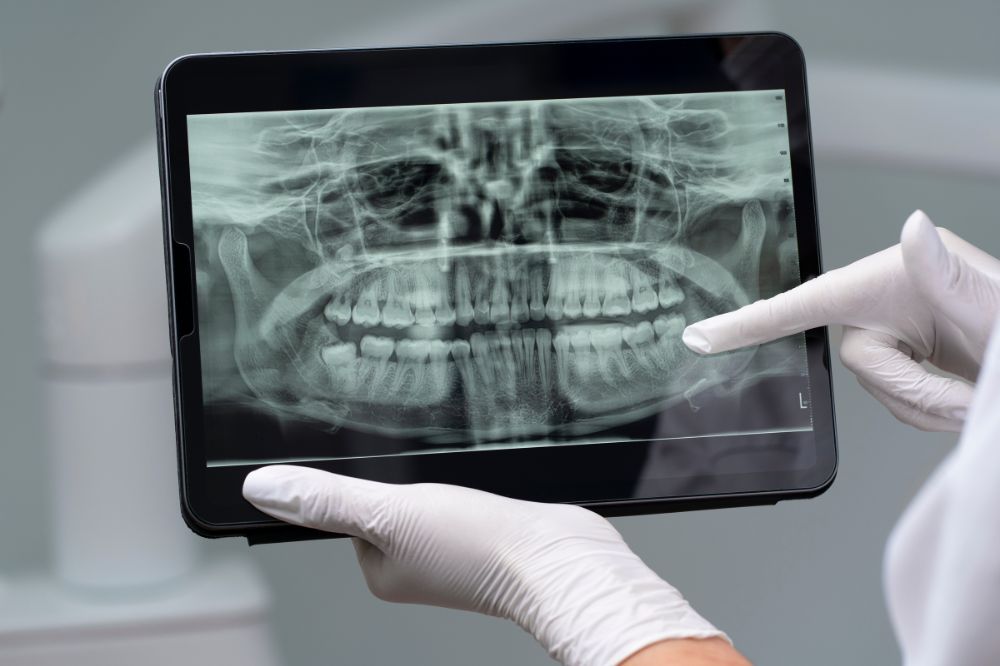Yes, dental X-rays can help you identify hidden infections, and they can help identify early stages of oral cancer. X-rays do not identify cancer directly, but they allow the dentist to see what is going on below the surface of your teeth and gums.
If you have pain in your jaw, loose teeth, or swelling that lasts more than a few days, then it is time to go for Dental X-rays in Miami. X-rays are fast and stress-free and can detect problems that you cannot feel or see.
How Do Dental X-Rays Work?
Dental X-rays utilize small doses of radiation to get images of your mouth to see:
- The roots of your teeth
- The bone around your teeth and jaw
- Any infections, cysts, or tumors that might be forming
X-rays are useful because they can catch early signs of problems like:
- Bone infections (abscesses)
- Tooth decay between teeth
- Gum disease damage
- Impacted teeth
- Bone loss that might suggest something more serious
These images help your dentist in Miami make accurate decisions before the pain gets worse or the issue becomes more serious.
Can X-Rays Spot Oral Cancer?
Dentists discover unusual areas that could potentially be signs of oral cancer through dental x-rays, such as:
- Bone erosion in the jaw
- Tumors forming under the gums
- Unexplained dark spots or masses
However, they are not exclusively used to indicate cancer. If there is anything that appears questionable, your dentist will send you to an expert to obtain a biopsy or other complicated tests, this is why it is important to visit a dentist near you regularly, as X-rays can catch severe conditions even before you have symptoms.
What About Infections Deep in the Bone?
X-rays are one of the best tools for finding hidden infections. Sometimes, an infection might be under a tooth or in the jawbone and cause no pain at all until it spreads.
A dentist can see:
- Abscesses (pockets of pus)
- Dead tooth roots
- Sinus infections that affect the upper jaw
If you’ve had tooth pain, pressure, or swelling in the face, visit a dental office near you. X-rays help get to the root of the problem.
Are Dental X-Rays Safe?
Yes, dental X-rays use a very small amount of radiation and are considered safe for both kids and adults. Your dentist will usually:
- Use a lead apron to protect your body
- Take only the images necessary
- Space out X-rays based on your oral health risk
Most dental X-rays near you are digital now, which means they use even less radiation than older methods and provide faster results.
Take the first step to a happier, healthier smile.
Schedule your visit with Caring Dental Services in Miami today & experience compassionate, expert dentistry.
Book Appointment Call UsHow Often Should You Get Dental X-Rays?
It depends on your dental history and risk. Your dentist might recommend X-rays:
- Every 1–2 years for routine checkups
- More often, if you have gum disease, pain, or a history of dental problems
- Before major procedures like implants or root canals
A trusted dentist near you will only take X-rays when necessary and explain the reason clearly.
Protect Your Health from the Inside Out
Early detection is the key to keeping your smile and your overall health safe. Don’t wait for pain or swelling to take control. Dental X-rays are a powerful, safe tool that helps catch hidden infections and spot early warning signs of bigger issues.
If you’re in Miami and need expert dental care, Caring Dental Services Miami is here for you. Our team uses digital X-rays to give you the clearest, most accurate care possible.
Book your appointment today and get the answers your mouth needs before small problems become big ones.
FAQs About Dental X-Rays and Oral Health
1. Can X-rays detect cavities?
Yes, especially the ones between teeth or under old fillings that are hard to see.
2. How long does a dental X-ray take?
Just a few minutes. Some digital systems show results almost instantly.
3. Can I get X-rays if I’m pregnant?
In most cases, dentists will delay X-rays during pregnancy unless it’s an emergency. If needed, they use extra protection.
4. Are dental X-rays covered by insurance?
Many basic dental plans include X-rays, especially during annual exams. Check with your provider for exact details.

